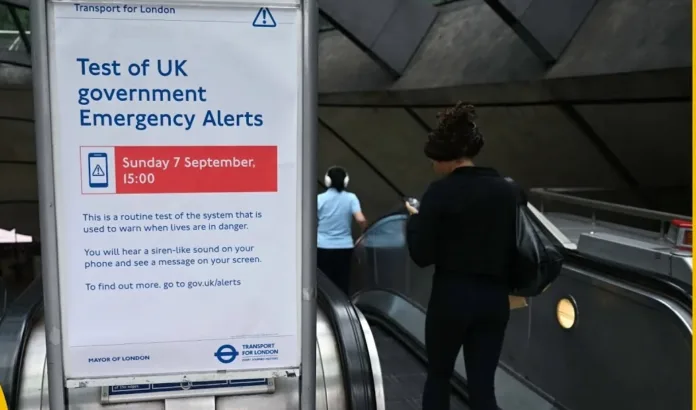“Government conducts nationwide test of phone alert system designed for life-threatening crises”
Millions of phones across the UK erupted with a loud siren on Sunday afternoon as the government carried out the latest nationwide test of its emergency alert system.
The alarm, which activated at 3pm, lasted around 10 seconds. It was accompanied by a screen message explaining that the signal was a test and outlining the purpose of the service.
“This is a test of Emergency Alerts, a UK government service that will warn you if there’s a life-threatening emergency nearby,” the message read. It instructed users that no action was needed but urged people in real emergencies to follow on-screen advice to stay safe.
The distinctive noise was designed to override volume settings so it could be heard in noisy environments. The service is intended to be used only in situations posing immediate danger to life, such as extreme weather events, terrorist incidents, or major disasters.
While millions of devices sounded simultaneously, the alert did not reach every phone. Older handsets, devices not connected to 4G or 5G networks, or those switched off or in flight mode, were excluded. People can also opt out of receiving alerts — an option flagged as essential for domestic abuse survivors who keep a concealed handset.
The government said Sunday’s exercise was part of routine testing to ensure the system functions effectively when needed most. Officials estimate there are about 87 million mobile phones in the UK, though no figures were provided for how many received the latest message.
Pat McFadden, the work and pensions secretary, compared the technology to a “national fire alarm” and insisted regular checks were vital. “Testing ensures the system continues to work correctly and reaches as many people as possible when it’s needed most,” he said.
The timing of the drill had a ripple effect across sporting events. Several football and rugby matches were briefly delayed to avoid clashing with the alarm, while play paused in England’s cricket fixture at the Utilita Bowl.
This was not the first time the system had been tested. A nationwide drill in April 2023 revealed that some networks failed to deliver the message, prompting further refinements. Since then, the technology has been deployed in five genuine emergencies.
In February 2024, alerts were sent to residents in Plymouth when a wartime bomb was discovered in a back garden, triggering large-scale evacuations. In December that year, about 3 million people in Wales and south-west England received warnings linked to Storm Darragh. A month later, Storm Éowyn prompted alerts to around 4.5 million people across affected regions.
The government argues the system has already proved its worth, saving lives by quickly notifying the public of imminent threats. Critics, however, have raised concerns about the disruption caused by tests and the potential misuse of the technology.
Ministers maintain that the benefits outweigh any inconveniences, insisting that the ability to instantly warn the public during a national crisis could be decisive in protecting lives.
For most phone owners on Sunday, the test was a brief inconvenience: a sudden, piercing sound followed by a reassuring explanation. But for emergency planners, it was another vital step in making sure that when the siren next sounds, it is heeded as a genuine warning
